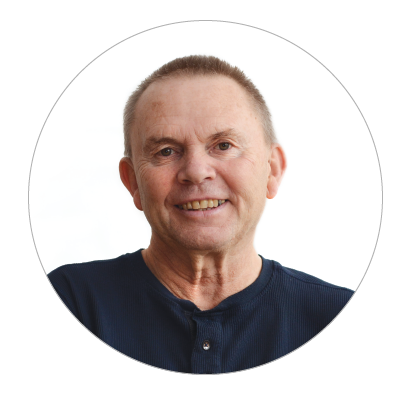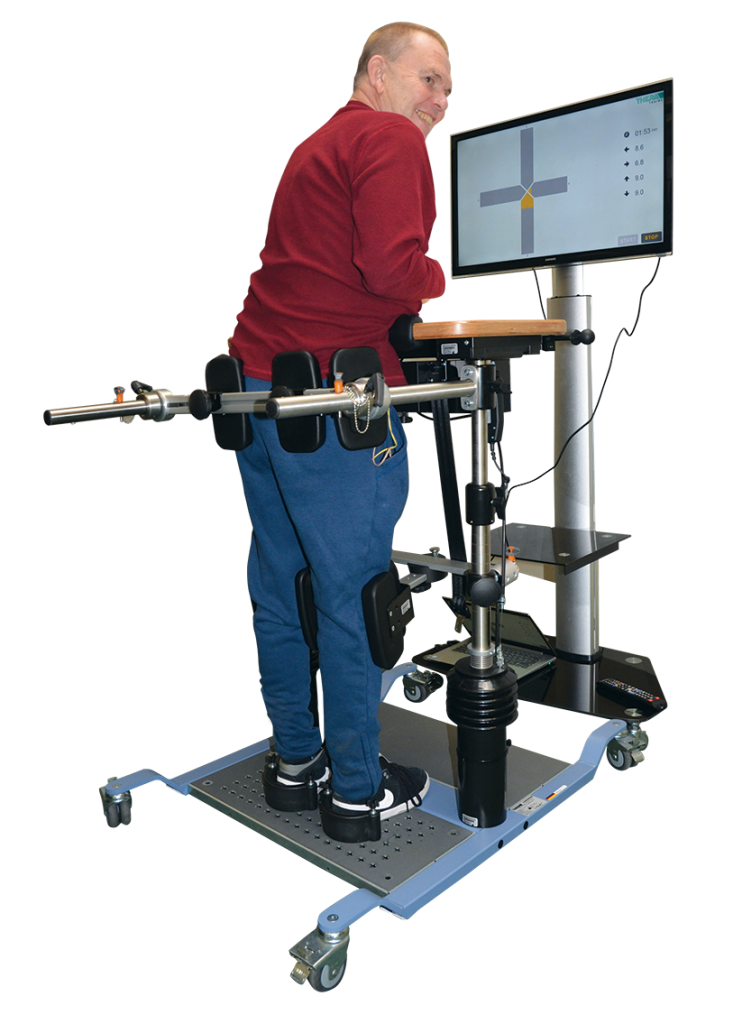

I came to Reach For Health with the community stroke team and absolutely loved the place; it’s just so unique. I wanted to carry on working on my progress so decided to join Reach For Health after I was discharged from the Stroke team.
Alan Martin

I was always fairly healthy; I rarely needed to go to the doctor. The only health issue I had was type two diabetes, which I was diagnosed with twenty years ago. My job was very active and involved a lot of running around so I was always fairly fit. I had no stress with my job as I absolutely loved it, it was fantastic. I also enjoyed playing football regularly with my son.
Q. What happened on the day your life changed?
Five years ago, in the summer of 2013, I suffered a spinal stroke. It was a perfect warm July day, we’d had friends over for a BBQ and we all had a great time. Looking back there were no signs leading up to the stroke, everything seemed normal. I had however been suffering with quite sharp indigestion during the evening but put this down to the onions I had eaten. I took some tablets to try to calm it and went off to bed. I woke at 11pm with the same feeling of indigestion but a little worse; I also had pain down my left arm. My immediate thoughts were that I was having a heart attack. My legs then started to feel strange, I can’t describe how they felt even to this day, it was just an odd feeling of numbness. I managed to get downstairs but the numbness was getting progressively worse as was the pain in my arm. Kim and I decided to call for an ambulance. The paramedics arrived quickly and the first thing they did was an ECG, which read as normal, my heart was fine. I was in obvious distress so, as they couldn’t work out what was wrong with me, they gave me the option to go into hospital to be checked over. As I hadn’t had the best experience with hospitals in the past I said I didn’t particularly want to go in, but as I tried to get up to say goodbye, I collapsed. I was taken to Northampton General Hospital.
Q. How did the hospital deal with your symptoms?
While waiting to see a doctor, my symptoms were becoming worse by the minute and I was frantic with worry. The numbness was traveling upwards from my legs to my arms; eventually I couldn’t feel anything from the neck down. I kept asking the nurses to please help me, but as I could still speak I think they just assumed I was hyper ventilating.
Eventually a doctor carried out a pinprick test all over my body and when I obviously couldn’t feel anything, he realised something was seriously wrong. I was transferred to a ward and went through multiple neurological tests, MRI, CT Scan etc. I remember I had to give permission for the MRI to be carried out, the only thing I could manage to sign on the form was an X, and this really scared me. The MRI results came back inconclusive. I had doctors from several other hospitals coming to assess me as the doctors at Northampton General were struggling to reach a diagnosis.
After ten days Dr. Paul Davies, Neurology Consultant from John Radcliffe Hospital in Oxford, finally diagnosed that I had suffered a Spinal Stroke. A spinal stroke is a disruption in the blood supply to the spinal cord. Spinal strokes are extremely rare and very difficult to diagnose hence the length of time it took to find out what had happened to me.
Q. What treatment did you receive after your diagnosis?
I spent ten weeks in NGH under the care of Dr. Melanie Blake, Neurology Consultant, who was absolutely fantastic. I started physiotherapy sessions with the Stroke Team within this period. I obviously couldn’t walk so had to be lifted onto the treadmill in the hospital gym using a hoist. I had four physiotherapists working on me simultaneously, one on each leg and one on each arm.
I was desperate to be moved nearer to home and thanks to my GP Dr. Jonathan Hill; I was transferred to Danetre Hospital, which felt fantastic. To me it was heaven as it was a much calmer and quieter environment. The physiotherapy team were excellent at Danetre. I had one-to-one treatment with an amazing lady called Birgit Scott. The main focus was getting me to walk and climbing stairs. I would be hanging on with Birgit behind me being so determined and focused. I said to Birgit that the one thing I was going to do when I was discharged was to walk out of the hospital; I am very proud that I did.
Q. How is life five years on?
Two years ago I decided I wasn’t entirely happy with how Northampton General had left things. After a lot of research and with the help of my GP Dr Jonathan Hill and the Reach for Health Team I was referred to the University College Hospital, Neurological Centre in London, I believed that there must be something else out there that could help improve my condition and lifestyle. I spent a week at UCHL where I was under the care of Dr. Richard Greenwood, Consultant Neurologist. I visited the hospital numerous times as an outpatient and underwent various tests; I also spent several days as an inpatient so they could carry out more intensive tests. From the test results it was decided that a machine named Functional Electrical Stimulation, would make a big improvement to my walking. The FES applies small electrical changes to the leg to improve mobility; it is a fantastic piece of equipment. I now have an adapted car that has given me back some independence and also means I can get to Reach For Health when I want to instead of relying on lifts. I can now run my children around wherever they need to go which Kim used to have to do, so this helps my wife out a lot and gives her some of her life back. As we lost my income when I had my stroke, my wife had to go from part time to full time employment as well as being my main carer. I can’t prepare any food or even carry a cup of tea so I have to rely on Kim to do everything for me. Her support has been simply amazing. It has been an incredibly tough time for the family both financially and emotionally.
Q. How did you find out about Reach For Health?
I came to Reach For Health with the community stroke team and absolutely loved the place; it’s just so unique. I wanted to carry on working on my progress so decided to join Reach For Health after I was discharged from the Stroke team. I didn’t want to just sit at home and vegetate which I would have done if it hadn’t been for the motivation gained from the team at Reach For Health. I now attend three times a week and really look forward to it.
Q. Has coming to Reach For Health helped you?
It has helped me both physically and mentally. Going from being hoisted onto a treadmill five years ago I can now walk for twenty minutes. I’ve come a long way with the support and guidance from the Reach For Health team. The specialist equipment, in particular the Thera Balance, helps my progress so much, it’s an amazing piece of equipment, and it has been my saviour. I’ve noticed a huge improvement in my balance from using this, for example; if there was a small object on the floor, I would never of have been able to pick it up without falling over but now I can pick it up, all because of the Thera Balance. I was lucky enough to have a trial on an upgraded version of the Thera Balance Machine when Reach For Health had it on loan for a week. The centre has started a fundraising campaign to raise the necessary £5,000 to upgrade the existing machine. Along with others who attend the centre I would be over the moon if we get this as it will give me feedback and guidance to my movements. In addition to this, Reach For Health has also helped me regain some upper body strength; I actually have some muscle definition now. I really enjoy the upper body exercises.
Q. What are your goals for the future?
I have a few goals, my main one being walking without a stick, that’s my main drive and focus especially as my house is at the top of quite a steep slope. Another goal is to be able to walk to and from my local pub. I’ve managed to walk there but have needed a lift back. My long-term aim is to continue regularly attending to Reach For Health, ideally without any walking aids.
Q. What does Reach for Health mean to you?
Very emotionally…… It means everything to me. It gives me freedom, I get to meet people and It’s making me stronger. I just love coming here!